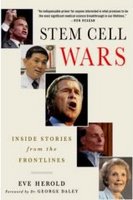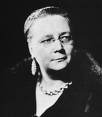
What I think about Stem Cell Wars: Inside Stories from the Frontlines has everything to do with my own presuppositional framework. I believe in the sanctity of life at every age and stage, so I hold the human embryo in high regard - as an image bearer of our Creator - an image bearer at the earliest stage of life. But what I think about the book also has EVERYTHING to do with the author. In the coming days (probably weeks) I will be posting many quotes from this book, showing how Eve Herold has little grasp on the foundations of the arguments - and even the arguments themselves - of those who identify themselves as prolife.
The soldiers on this side of the conflict also insist that therapeutic cloning, or the cloning of patient-specific stem cells, is no more than a prelude to the wholesale cloning of human beings. (p.40)
This statement is fraught with confusion. The soldiers, as she refers to them, are people like myself who understand that the cloning of embryos through the process of somatic cell nuclear transfer is reproductive cloning. Therapeutic cloning is a term that allows proponents of embryonic stem cell research to avoid calling it what it is: embryo-destructive research. It's very similar to the use of the word "pro choice." We, opponents of ESCR, are not worried that therapeutic cloning is a prelude to cloning human beings, we believe it IS the cloning of human beings.
Contrary to what many anti-cloning activists want us to think, therapeutic cloning and reproductive cloning are two very different things. Reproductive[emphasis hers] cloning is the creation of an exact genetic copy of an entire organism. (p. 49)
Contrary to what the author seems to think she understands, there is only one kind of cloning. The term 'therapeutic' simply means that the created embryo is targeted for destruction for research purposes. In fact, advocates of cloning ought to abandon the term 'therapeutic' in the sense in which they are using it and rather call it research cloning. But I digress.
Somatic cell nuclear transfer is the process in which "an exact genetic copy of an entire organism" is created. Each of us were once at the embryonic stage of development, and so the process does produce exactly what Herold says it does not.
Those of us who view all cloning as reproductive cloning do not believe that scientists want to grow 6 year old children from which to harvest body parts. For Herold to assert that that is what we believe is at best, confused, but is probably just evidence of her own politicizing of the issues. She and others of her ilk need prolife conservatives to look as ridiculous as possible. But this would not be of our doing - this is their caricature.
Therapeutic cloning, which is also referred to as nuclear transfer, is a technique for creating embryonic stem cells that are genetically matched to a patient. (p. 49)
Wrong again. Therapeutic cloning is not a technique for creating stem cells, it is a technique for creating embryos from which stem cells can be harvested.
If our goal was to create a reproductive clone of Sandra, the embryo would at this point have to be transferred into a women with the hope that a pregnancy would result. But in therapeutic cloning, this never happens. (p. 49)
Again, it is all reproductive cloning. But now Herold wants us to believe that geography is the determining factor for human rights. The intention for therapeutic cloning is to never implant an embryo, but destroy it. This statement of Herold's is the worst in philosophical fallacies and is undeserving of the publisher's ink.
So the claims of anti-research activists that scientists are pushing to develop cloned embryos into fetuses and then harvest their body parts are pure nonsense. What scientists are interested in are these primitive, undifferentiated cells that only exist in the first few days of cellular division. (p. 49-50)
Again, Herold is either willfully ignorant or woefully ignorant. Those of us who are against ESCR would not say it as she has stated. We believe that what scientists are pushing for, to harvest the stem cells from the so-called "early embryos" is akin to the harvesting of the body parts of adult humans. We believe this "harvesting of parts" is real, but is intended to occur in the first few days of life - not from 6 year old children stored in pods in some underground scientific lab. (Far worse, it would be under our noses in university labs) Herold, while acknowledging in other parts of the book that prolife advocates hold a high view of the embryo, forgets that we're still talking about the embryo when we are concerned about the harvesting of parts - i.e. stem cells.
One of the less publicized but still critically important outcomes of therapeutic cloning is the ability to clone the cells of patients with genetically based diseases. Cloned cells that care the mutations for......
Herold makes the same error again. Cloning is not about cloning cells of patients. Somatic cell nuclear transfer is the cloning of the patient at the embryonic stage from which stem cells are harvested. To state that this is the cloning of stem cells is in error.
Stem Cell Wars is a book full of misrepresentations and misinformation. To understand what prolife conservatives actually believe on these issues, go to Do No Harm or The Center for Bioethics and Human Dignity.



